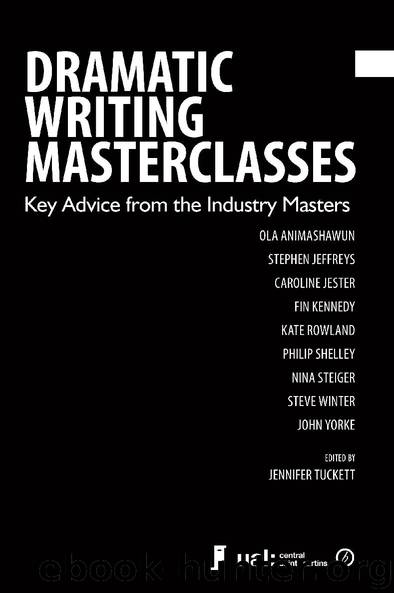Dramatic Writing Masterclasses: Key Advice from the Industry Masters by Jennifer Tuckett (Ed.)

Author:Jennifer Tuckett (Ed.)
Language: eng
Format: epub
ISBN: 9781783193257
Publisher: Oberon Books
Published: 2017-07-15T00:00:00+00:00
INTERVIEW SIX
OLA ANIMASHAWUN
BY JULIE ZHENG
JULIE ZHENG: Could you tell us about yourself and what do you do?
OLA ANIMASHAWUN: I do two things. I’m an Associate Director at the Royal Court Theatre and I also run my own company called Euphoric Ink. I do the same thing for both of those organisations, which is primarily to run writers workshops with a view to inspiring writers to write. Then, once they’ve done that, I support and encourage them and try to ensure they do it to the best of their ability. That’s a long-winded way of saying I’m a bit of a dramaturg on the side.
JULIE ZHENG: What’s the philosophy that you conduct in workshops for writers?
OLA ANIMASHAWUN: My philosophy is just get writing, then let’s see what we’ve got and then to take things from there. It’s a philosophy which comes from the Royal Court, which regards the writer as the primary artist, within the collaborative art form, which is theatre. So they’re at the centre of that entire process and, without them, we have nothing. People like me are a waste of space, as are directors, as are designers etc. That’s first and foremost. Obviously, as I said, it’s a collaborative art form – everyone has something to give – but it’s writer-led, it’s writer-driven, so everything I do is to support the writer in their vision.
JULIE ZHENG: What do you think we, as dramatic writers, need to know about the craft of playwriting?
OLA ANIMASHAWUN: I think that you do need to know about Aristotle and that approach to writing and structuring your writing and your form. Then you need to know about all the other writers who have challenged that form or have broken those rules and those conventions.
I think it’s important that you know what the rules and conventions are to begin with – if you’ve got them under your belt, up your sleeve, inside your soul and at the core then you can have a lot of fun as you move away from that and push the form forward. As artists, essentially what you’re always trying to do is break new ground, pioneer new ideas and take things in a new direction.
I think I’d even go so far as to say it’s essential that you know what those rules and what those conventions are. Someone said recently, “It’s 4,000 years of storytelling.” That’s a long time. There’s a reason why it’s endured, and I think you can decide that’s either because people got lucky – Aristotle got lucky or writers get lucky and tell stories in a particular way that seems to work – or there’s a reason why they seem to work. Why they work is to do with who we are as a species, our understanding of narrative and our understanding of form – how we make sense of life and how we make a meaning out of life.
Once you’ve got that, there’s nothing to say that you can’t play around with it, and bend
Download
This site does not store any files on its server. We only index and link to content provided by other sites. Please contact the content providers to delete copyright contents if any and email us, we'll remove relevant links or contents immediately.
Asking the Right Questions: A Guide to Critical Thinking by M. Neil Browne & Stuart M. Keeley(5755)
Autoboyography by Christina Lauren(5226)
Eat That Frog! by Brian Tracy(4519)
Dialogue by Robert McKee(4386)
Sticky Fingers by Joe Hagan(4188)
Journeys Out of the Body by Robert Monroe(3615)
Annapurna by Maurice Herzog(3464)
Full Circle by Michael Palin(3443)
Schaum's Quick Guide to Writing Great Short Stories by Margaret Lucke(3369)
Elements of Style 2017 by Richard De A'Morelli(3339)
The Art of Dramatic Writing: Its Basis in the Creative Interpretation of Human Motives by Egri Lajos(3058)
Atlas Obscura by Joshua Foer(2952)
Why I Write by George Orwell(2944)
The Diviners by Libba Bray(2927)
The Fight by Norman Mailer(2926)
In Patagonia by Bruce Chatwin(2919)
The Mental Game of Writing: How to Overcome Obstacles, Stay Creative and Productive, and Free Your Mind for Success by James Scott Bell(2897)
Venice by Jan Morris(2568)
The Elements of Style by William Strunk and E. B. White(2470)
